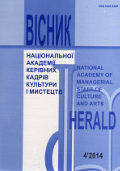ФУНКЦІОНУВАННЯ КОНЦЕПТУ "РІЧ" У ДИСКУРСІ ТЕОРЕТИКІВ АКТОРНО-МЕРЕЖЕВОГО ПІДХОДУ
The functioning of the concept "thing" in discourse of the actor-network approach theorists
Author(s): Yana KononovaSubject(s): Politics / Political Sciences, Philosophy, Cultural Anthropology / Ethnology
Published by: Національна академія керівних кадрів культури і мистецтв
Keywords: actor-network; constructivism; materiality; thing; politics; science; society; nature;
Summary/Abstract: The interpretive framework translocation, being happening in contemporary sociological thought and the turning to materiality are in the focus of this study. The problems associated with the peculiarities of the concept "thing" functioning in discourse of the Actor-Network approach theorists are considered. Within the confines of efforts to create a new optics of the sociological discipline and the classical problems revision the content of the French leading methodologist, philosopher and sociologist of science Bruno Latour basic concepts is revealed.The modern science is beginning to deal with the complex socio-natural systems, when sociological or natural-scientific methods particularly for object research and interpretation are inadequate: the centaurs objects are the feature of scientific knowledge at the end of the XX and the beginning of the XXI century. One of the solutions of this situation is the Actor-Network Theory (ANT) implementations, which are submitted in Bruno Latour works. Bruno Latour is the philosopher and sociologist of science, anthropologist, professor and vice president of Institute for Science Political Sciences of Paris. The methodological orientation of Latour’s research program is to make things public, that means to see scientists and engineers activities in a new light. In scientific laboratories as Latour shows, classic disjunction of nature and politics composing the modernist constitution of our ideas is no longer in force. This constitution, embodied in theoretical knowledge, where the rigid separation of the natural from the social with their further specular contradistinction and coalescence in recognizable scenes of interaction between nature and culture is being enforced. According to Latour it leads to contradictions between reality and construction in modernist philosophies.Latour uses four theoretical possibilities for problematizing the emergence of social phenomena, the new agents and innovations. In each of these perspectives the various aspects of constructing things are investigated and positivist and postpositivis approaches are reconsidered. They can be enumerated as follows: 1). the concept of second empiricism, offering a new understanding of the collective experience and current practices; 2). concept of interobjectivity, offering specific development of things materiality reflection; 3). constructivist metaphor of trial of strength, investigating the transformation of things from weak hypotheses to the right-full agents of collective reality; 4). the sociology of associations project, exploring the principal modes of different groups and communities composing and association.The first empiricism, appropriated to positivist paradigm of scientific researches scheme and Kantian transcendentalism are opposed to the second empiricism in Latour’s statements – pluralistic practical metaphysics of all collective reality agents are approved. The things taken in such a focus, appear as the controversies sources. The term matter of concern should replace the term matter of fact from the positivist approach.The problem of interchange of properties between all participants of relations such as people and material objects is also developed in Latour’s works. None of the parties in this case are vested in a privileged status. The involvement of material objects in human affairs testifies not only about embodied designs of engineers, but also about the creating of new social relations and the emergence of unexpected sources of action. The task is to find a theoretical possibility of studying the exchange between the participants of relations, because the ideology of modernity requires a strict disjunction between human subjectivity and objectivity of natural things, free human intention and physical determinism. In accordance with the modernist principles to combine in assemblages mechanistically functioning things and freely making decisions people would be absurd. Through reconstruction Pasteur practices and widely deployed social-hygienic movement in France, Latour also captures the contingency of new actors occurrence and constitution such as forces and different interests compositions, and at the same time, he articulates the materiality of process – the amount of spent efforts and resources to create a sustainable network of relationships. The constructivist metaphor of trial of forces is developed in these two directions.The investigation of the variation emergence in the life of communities is in the focus of Latour’s the Sociology of Translation. This is the fundamental difference between the ontological presuppositions of Sociology of Translation and the whole fan of present-day Theories of Practice, elaborated on the daily routine phenomenology and centred on routinized activity of human relations subjects. The elements of Latour’s constructivist ontology are various heterogeneous elements such as strengths, interests, influences, participations and various modes of existence, in which different heterogeneous relations linkages are assembled.The works of the Actor-Network approach theorists are deployed on the background of inevitable syncretic approaches and the general theoretical interest in the development of social sciences and humanities proper methodology. The high demand and the crucial role of these sciences are combined with their poor cognitive status, forcing to refer them to weak or disadvantaged disciplines, to contradistinguish them potent and prosperous the natural sciences. At the same time, the bulk of the philosophical methodology is related to natural sciences, being mainly a generalization of the physics experience development and ignores practically the specificity of social knowledge. Thus pragmatics of Latour’s project is to problematize proper humanities methodology possibilities and to attempt to reorganize the scientific knowledge paradigm.
Journal: Вісник Національної академії керівних кадрів культури і мистецтв
- Issue Year: 2014
- Issue No: 4
- Page Range: 54-59
- Page Count: 6
- Language: Ukrainian

